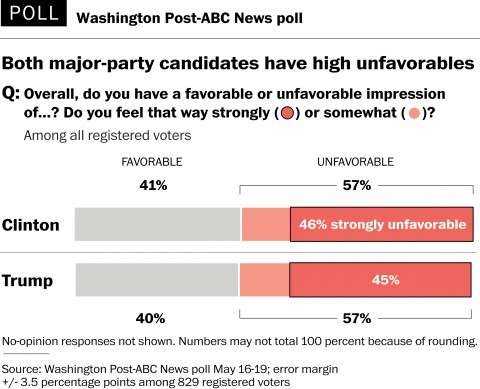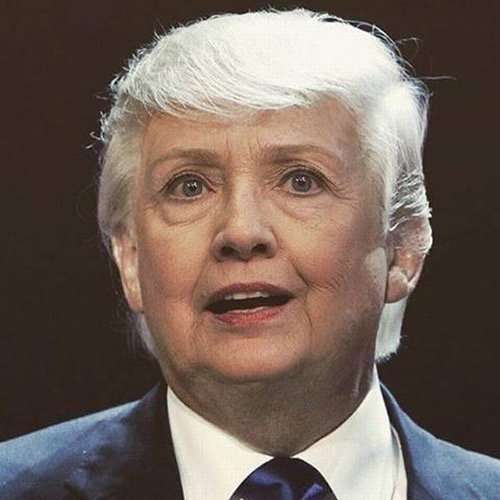One of the Them Will Win, But Donald Trump & Hillary Clinton Are Unacceptable To Most Voters
Bernie Sanders says we shouldn't be forced to "vote for the lesser of two evils."

"I don't want to see the American people voting for the lesser of two evils," Sen. Bernie Sanders (I-Vt.) told viewers of This Week with George Stephanopoulos on Sunday. To be clear, he was implying two things: First, that Donald Trump is the greater of two evils and second, Hillary Clinton is evil. To be fair, he has said he'd rather see her in the White House than Trump—but not as much as he'd like to see himself.
Sanders might be overstating it a bit, but most Americans are in a similar state of mind. A new Washington Post/ABC News poll of registered voters finds nearly 60 percent of us view Trump and Clinton unfavorably.
"Never in the history of the Post-ABC poll," write Dan Balz and Scott Clement, "have the two major party nominees been viewed as harshly as Clinton and Trump."
Let's be clear: The problem isn't with voters, it's with the candidates. You can debate whether Clinton is not as utterly awful as Trump (as some libertarians hold) but we don't need to go there, really, do we? It's enough to say that both presumptive nominees are, in the term of liberal friend of mine, unacceptable. When 57 percent are saying you suck, something has gone wrong with the selection process, hasn't it? The only thing surprising about the case of Mary Anne Noland, the 68-year-old Virginian who chose to die rather than face a Trump-Clinton choice, is that there aren't dozens of such cases a day!

The Wash Post/ABC poll finds 44 percent of voters want a third-party candidate and in a potential three-way contest including 2012 GOP loser Mitt Romney, Clinton gets 37 percent, Trump 35 percent, and Romney 22 percent. This is sound of an electorate deeply dissatisfied with what the Democrats and Republicans are offering. No wonder then, that party identification is at historic lows for Democrats (at 29 percent) and near a historic low for Republicans (26 percent).
Gary Johnson, the best-known candidate vying for the Libertarian Party nomination, has pulled 10 percent and 11 percent in recent polls—and the indications are that he would take support from both Clinton and Trump (recall that in the 2013 Virginia governor's race, Libertarian Sarvis, who won almost 7 percent of the vote, pulled far more from Democrat Terry McAuliffe than from Republican Ken Cuccinelli).
A strong Libertarian Party ticket is one obvious way to force the major parties to field candidates who can appeal to wider swaths of voters. Socially liberal and fiscally conservative libertarians comprise the single-largest ideological voting bloc according to Gallup. Using questions on the scope of government in the economy and whether government should support traditional morals, Gallup finds 27 percent of voters are libertarian, 26 percent are conservative, 23 percent are liberal, and 15 percent are populist.
If the Democratic Party and the Republican Party lived up to their various feints toward libertarian rhetoric, they would certainly blunt the appeal of most third-party candidates but certainly anybody put up by the LP itself. The refusal to do so will likely be the undoing of one or both of them. Consider the fact that Hillary Clinton is not just an unregenerate hawk on foreign policy. She is an all-in drug warrior and a hater of the sharing economy who, like Donald Trump, has called for Internet censorship. On the either side of the aisle, Trump's mass-deportation plan implies the creation of a your-papers-please police state and his trade policy is good old American protectionism on steroids. Exactly where he stands on most issues is anybody's guess (on foreign policy, he's promised both "bomb the shit out of them" and get other countries to fight their own battles).
The role of third parties isn't necessarily to win elections. At least in part, third parties represent the views of voters left out or ignored by the major parties. More and more of those being ignored are temperamentally libertarian. That is, more and more of us agree, in the phrase of CNN's regular survey, that "government was doing too much."
Neither the Dems or the Reps promise to address that complaint, despite about 60 percent of us feeling that way. To the extent that the LP speaks to that concern—and offers up a compelling way to pare the state back while giving people more ability to live their lives on their own terms—it will shape how the major parties change and adapt as they go hunting for new voters.


Show Comments (54)